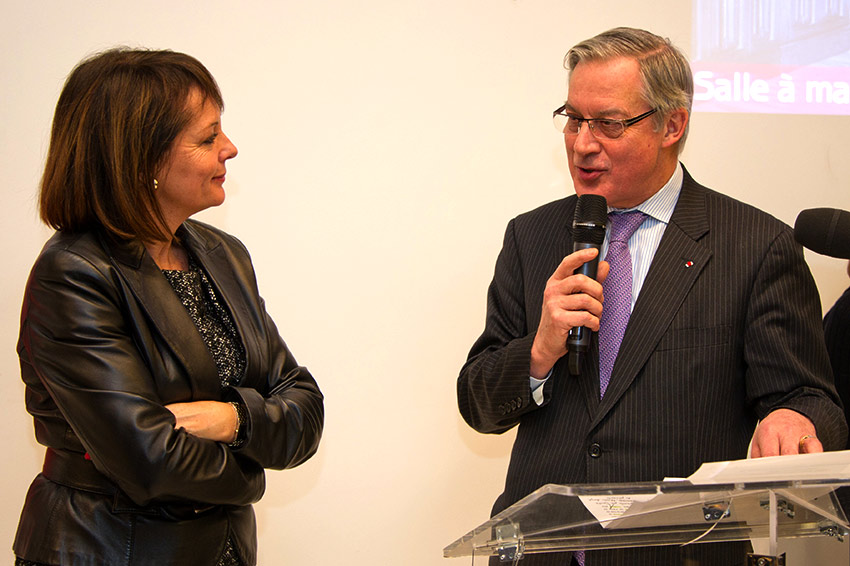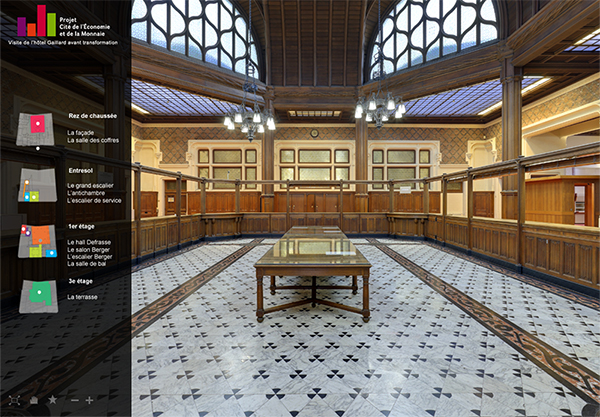The designers focused equal attention on the old Hôtel Gaillard and the later Banque de France buildings, with a clear ambition to widen and enhance the spaces and make more comprehensible the historical additions to the site. Hence, the clearance of the spaces between the buildings and the introduction of a glass dome above the former public hall of the bank would unite the complex, expose the interior façades of the Hôtel Gaillard and bring natural light into the heart of the building. It would also help visitors gain a better perception of the spatial and historical contexts.
By the creation of the Hall of Domes and consequently the superimposition of the exhibition rooms, the installation of giants personifying economic system players and the fractal decomposition of the scenographic elements, the architectural and scenographic project expresses the different scales of the economic world: the local scale, the global scale, the mediation scale, the visitors’ personal scale and that of the economic system at large.
The museum’s play-oriented and interactive installations incite visitors to learn about the economic sphere in concrete situations. The main economic notions and concepts are linked together in a staged transversal circuit: by accomplishing certain tasks, the visitor will gain concrete experience of these different notions. The circuit rewards the progress of each visitor by entrusting him/her with increasingly complex missions. It promotes specific access points to the skills base and encourages interaction between visitors through situations involving exchange, sharing, and cooperation. The interactive installations put all the elements of the project into relation and movement.
The City is firmly rooted to the architecture of the site but also opens out towards the digital environment. The presentation of the real world is intimately intertwined with that of the digital world to make a perfectly coherent package and a reference for new-generation museums. The digital aspects include the remote preparation of the visit, the multimedia mediation, the interactive tour, the recognition and guiding of visitors and the visitor’s logbook that can be accessed from home or from school.
Team Studio Adeline Rispal
Studio Adeline RISPAL, Paris
Lead architects and museographers
5+1AA Alfonso Femia Gianluca Peluffo
Associated architects
2BDM Architectes
Managing architects for historical monuments
SETEC Bâtiment
Technical Engineering and Environmental Design
AEI
Construction Economics
Licht Kunst Licht
Lighting
AVLS
Sound & Acoustics
Innovision
Multimedia Engineering and Design
Alexandco
Elaboration and design of interactive exhibition installations
Planitec
Site Management and Planning
Consultants :
Tess, Structural Engineering of Domes & Façades
Vulcaneo, Fire Security
Martine Thomas-Bourgneuf, museology
Orbe, conception of interactive circuit
Odilon Cabat, semiology
Anette Lenz, Signposting
Published on 05 April 2011. Updated on 12 September 2019
Explore also...
-

The City, Press room, Press events
A new life for the Hôtel Gaillard - January 16, 2013
-

The City, Teacher's corner, Guides
Cit€co: a guide for teachers
-

The City, The Hôtel Gaillard, Virtual visit
Virtual visit
-

The City, The keys of the economy, Players, Banks
Discover our new game: In a banker's shoes!
-

The City, Resources, The keys of the economy, Treasures, Banknotes and coins
Banknotes under inspection




